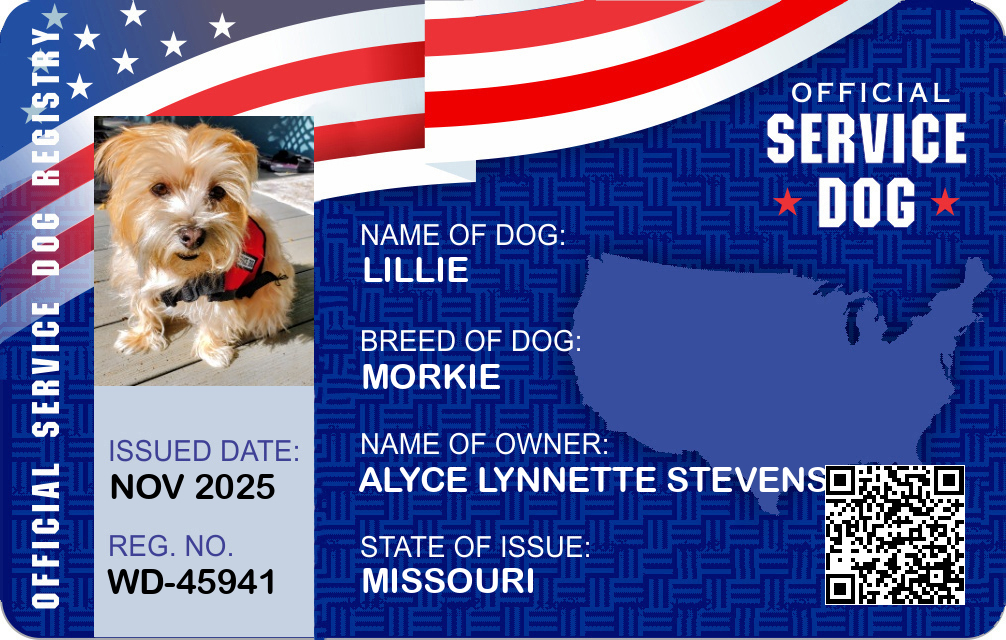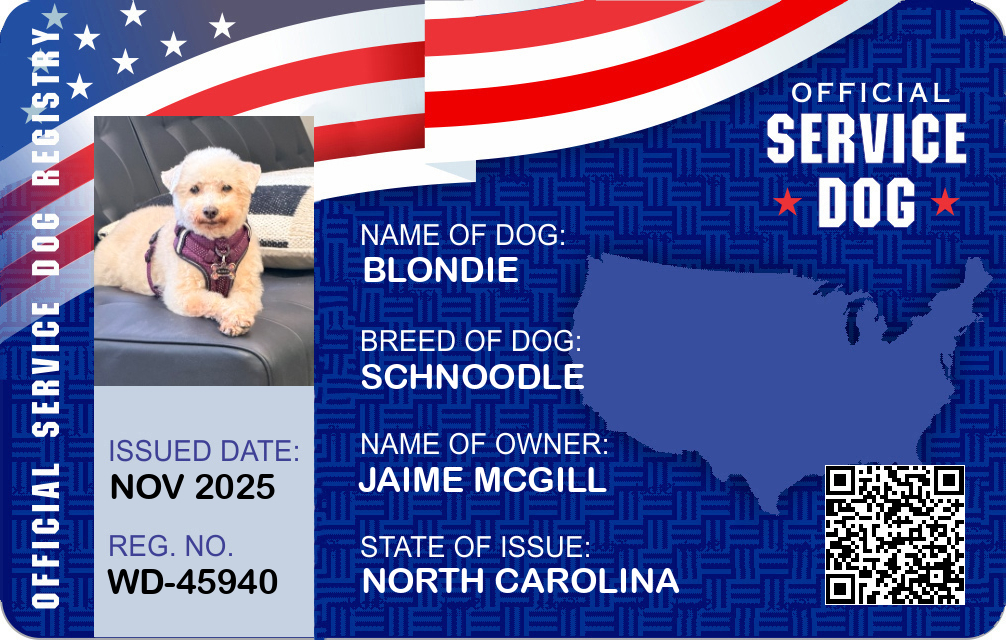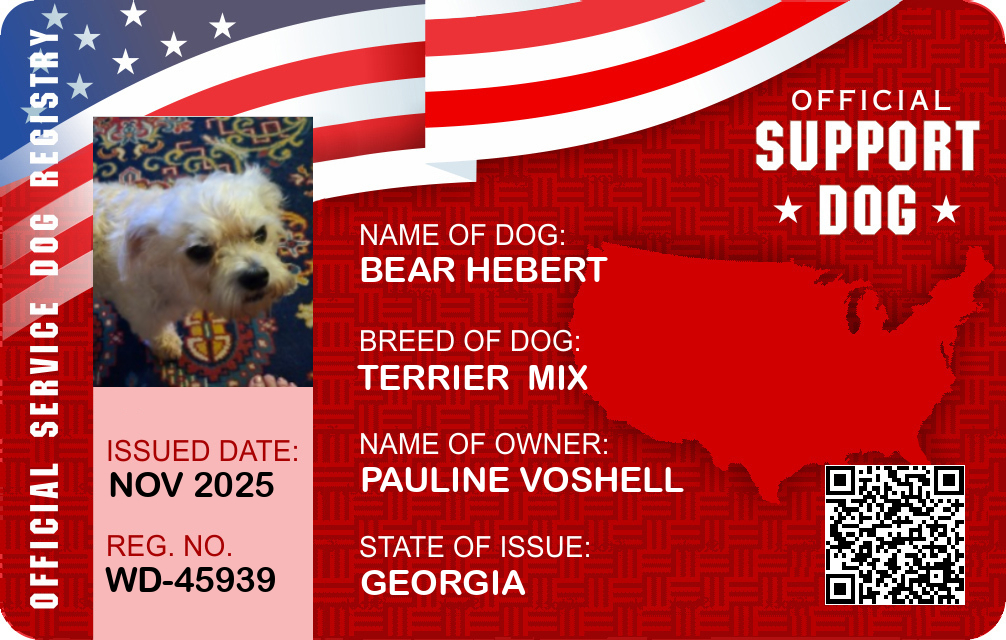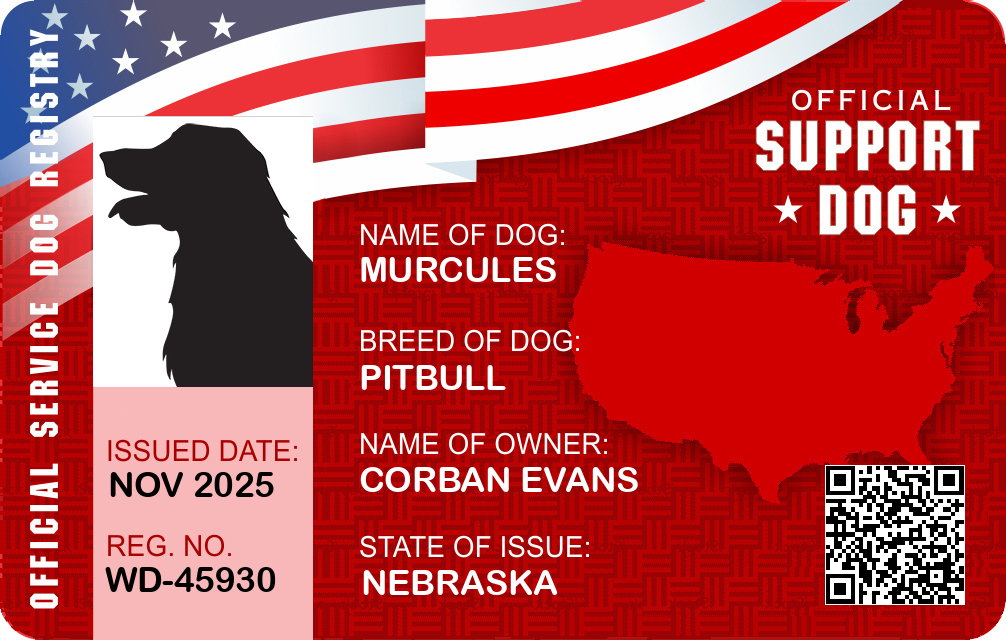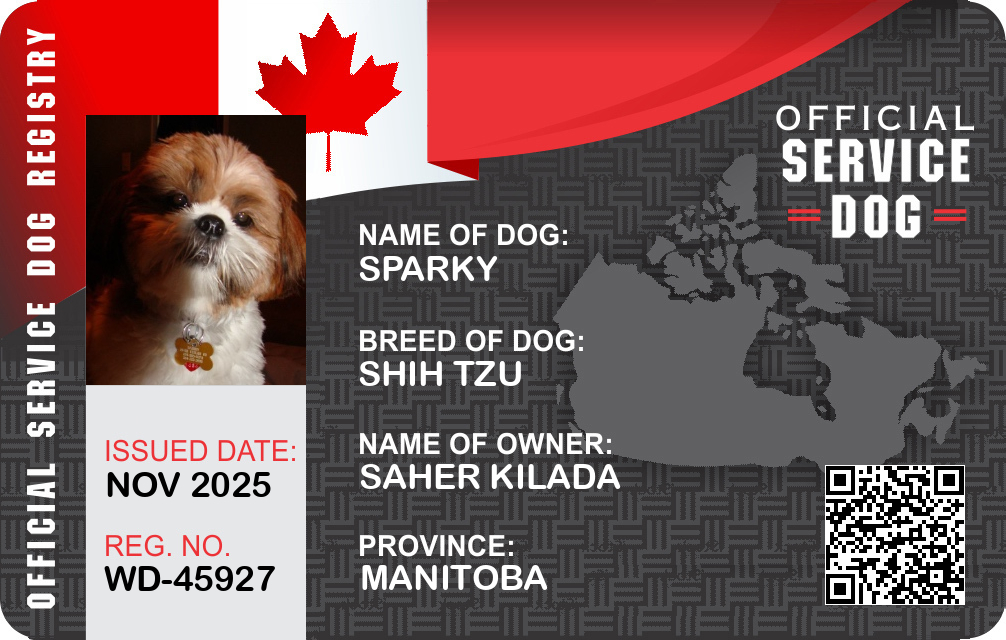Maine Service Dog Laws
Register Your Dog
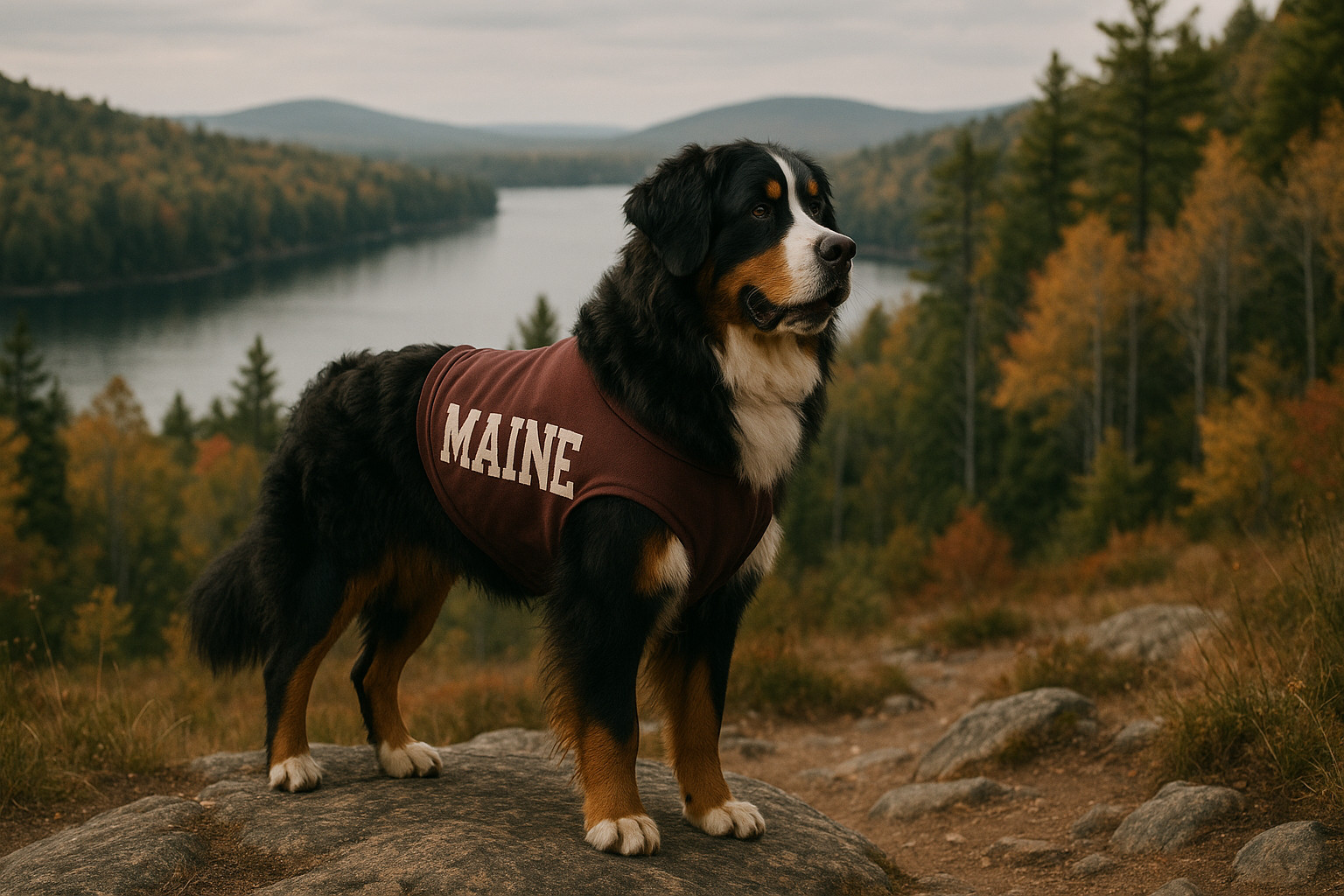
In the state of Maine, service dogs are recognized as essential companions to individuals with disabilities, providing them with the necessary support for daily activities. Understanding the laws governing service dogs is crucial for handlers, businesses, landlords, and the general public to ensure compliance and respect for the rights of individuals who rely on these invaluable animals.
Overview of Service Dog and Legal Definitions in Maine
What is a Service Dog?
A service dog is specifically trained to perform tasks for individuals with disabilities. These tasks mitigate the effects of the person’s disability, enabling them to live more independently. In Maine, as elsewhere in the United States, the definition of a service dog is consistent with the federal Americans with Disabilities Act (ADA). The ADA describes a service dog as a dog that has been individually trained to do work or perform tasks for a person with a disability. This training distinguishes service dogs from pets or comfort animals.
How Service Dogs Differ from Other Types of Assistance Animals
Several types of assistance animals exist, including emotional support animals (ESAs) and therapy animals, but service dogs hold a distinct status legally. While ESAs provide emotional comfort through their presence, service dogs perform specific tasks that address their handler’s disabilities. Therapy animals are often used in visitation settings, such as hospitals or schools, to provide psychological or physiological therapy to individuals or groups.
Key Federal Laws Affecting Service Dogs
There are three major federal laws relevant to service dogs:
- Americans with Disabilities Act (ADA): This law ensures that individuals with disabilities have equal access to public spaces and accommodations. Under the ADA, service dogs are allowed access to public areas where pets are typically not permitted.
- Fair Housing Act (FHA): The FHA allows individuals to live with their service dogs in most types of housing, even if pets are not permitted. This law aims to protect individuals with disabilities from discrimination in housing.
- Air Carrier Access Act (ACAA): The ACAA governs the rights of service animal handlers during air travel. Airlines must accommodate service dogs on flights without charging additional fees or requiring the dog to be in a carrier.
State-Specific Service Dog Laws in Maine
Maine adheres closely to the federal standards set by the ADA, with additional provisions under the Maine Human Rights Act. The state laws reinforce the ADA’s definitions and rights but may provide additional guidelines for specific situations that arise within the state. Understanding both federal and state regulations helps to avoid legal conflicts and misunderstandings.
Housing Rights and Responsibilities
Under Maine law, reinforced by the FHA, individuals with service dogs are entitled to reside with their dogs in housing that typically has a “no pets” policy. Landlords must provide reasonable accommodations, and they cannot charge pet fees specifically for service dogs. However, handlers may be liable for any damage caused by the service dog to the property. It is crucial for both landlords and tenants to communicate openly and understand their rights and responsibilities regarding reasonable accommodations.
Public Access and Accommodation
Service dogs have the right to accompany their handlers in all public accommodations such as restaurants, hotels, and stores. These rights are protected under the ADA and the Maine Human Rights Act. Businesses cannot charge extra fees or segregate individuals with service dogs from other patrons. However, service dogs must be well-behaved, and businesses have the right to request the removal of a service dog if it is out of control or not housebroken.
Transportation and Travel Rules
Transportation services, including buses, trains, and taxis, must accommodate service dogs. The ADA mandates that service dogs be allowed on all public transportation, and they should not be charged additional fees. Specifically, for air travel, the ACAA requires airlines to allow service dogs to accompany their handlers in the cabin without charge. It’s beneficial for handlers to inform airlines in advance to ensure a smooth travel experience.
Employment and Workplace Considerations
Employers in Maine must provide reasonable accommodations for employees with service dogs, following the guidelines of the ADA. This may include adjusting workspaces or allowing breaks to attend to the dog’s needs. Employers can request documentation proving the need for a service dog but cannot question the specifics of the disability. Open dialogue between employers and employees can help create a supportive work environment.
Documentation, Requirements, and Processes in Maine
Service Dog Documentation and Who Can Issue It
In Maine, as federally, service dog handlers are not r
equired to carry certification or identification to prove their dog’s status under the ADA. However, documentation can be helpful in resolving disputes or misunderstandings. This documentation typically includes a letter from a healthcare provider attesting to the handler’s disability and need for a service dog. Note that non-required certifications sold online do not hold any legal weight and can be considered fraudulent if misrepresented.Landlord, Business, and Provider Verification Rules
Businesses and landlords in Maine are permitted to ask two questions of handlers to verify a service dog’s status:
- Is the dog a service animal required because of a disability?
- What work or task has the dog been trained to perform?
Handlers are not required to disclose their disability or provide extensive personal information. Landlords and business owners should be knowledgeable about the limits of permissible inquiries to avoid infringing on individual rights.
Rights, Limitations, and Legal Risks
Rights Service Dog Handlers Have in Maine
Handlers in Maine have robust protections under federal and state laws ensuring access to housing, employment, public spaces, and transportation. They cannot be charged fees for accommodations and are protected from undue discrimination. Each situation — be it entering a new housing agreement or traveling — reinforces the handler’s right to have their service dog with them.
Limits on Service Dog Protections and Common Restrictions
Despite wide-ranging protections, there are limits. Service dogs must be well-behaved and under control at all times. If a service dog is disruptive or poses a threat, handlers may be asked to remove them from the premises. In addition, specific settings such as sterile hospital areas or private clubs may impose restrictions based on health or membership criteria. Handlers are encouraged to understand these rare exceptions to avoid accidental non-compliance.
Penalties for Fraud or Misrepresentation
In Maine, misrepresenting a pet as a service dog is a violation of the law. The state imposes penalties on individuals who falsely represent their pets as service animals, which can include fines and other civil penalties. This legal reinforcement helps protect the integrity of service dog programs and ensures that those who legitimately need service dogs maintain their credibility.
Practical Guidance for Service Dog Handlers in Maine
How to Qualify for a Service Dog Legitimately
Residents of Maine seeking a service dog should secure a diagnosis from a licensed healthcare provider, outlining the disability and the necessity of a service dog to perform certain tasks. Following this, the process involves obtaining a professionally trained service dog, either from a reputable organization or through professional private training. The emphasis should be on proper training to ensure the dog effectively assists the handler and adheres to public compliance requirements.
How to Talk to Landlords, Airlines, and Employers
When communicating with landlords, airlines, or employers, clarity and assertiveness are key. Presenting documentation or being ready to answer permitted questions under the ADA facilitates smoother interactions. Handlers should be proactive in addressing potential concerns and ensuring that all parties understand the legal rights involved. Maintaining professionalism and education-focused conversations often leads to positive outcomes.
Summary of Service Dog Laws in Maine
In summary, Maine supports service dog handlers through comprehensive legal protections consistent with federal guidelines. Understanding and abiding by these laws assures handlers of their rights and helps prevent conflicts with landlords, businesses, and employers. Handlers should be prepared with any necessary documentation and familiar with their rights and responsibilities, prioritizing compliance and open communication to optimize their daily experiences.
**Key Rights, Limitations, and Practical Tips for Service Dog Handlers in Maine**
- Service dogs are legally defined under the ADA and Maine laws.
- They must be allowed in public areas, housing, and workplaces.
- No extra fees can be charged for service dogs except for actual damage caused.
- Handlers are not required to show documentation but may choose to carry it.
- Fraudulently misrepresenting a pet as a service dog can lead to penalties.
- Open communication with service providers can prevent misunderstandings.
- Service dogs must be well-behaved and housebroken at all times.
By staying informed and respectful of the regulations and rights concerning service dogs, individuals in Maine can effectively navigate various environments with their service animals, enhancing their quality of life and interactions with the community.



